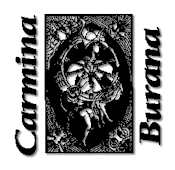
The Internet's Premier Classical Music Source
Related Links
-
Find CDs & Downloads
Amazon - UK - Germany - Canada - France - Japan
ArkivMusic - CD Universe
Find DVDs & Blu-ray
Amazon - UK - Germany - Canada - France - Japan
ArkivMusic-Video Universe
Find Scores & Sheet Music
Sheet Music Plus -
Search Amazon
Recommended Links
Site News
Carl Orff
Carmina Burana Lyrics

How would you describe Carmina Burana?
Orff's principal aim evident in Carmina Burana has been a 'total theatre' where music, words and movement work together in producing an overwhelming effect. He sought models of such a work in two cultural traditions: classical Greek tragedy and Italian Baroque musical theatre. Orff had previously written works based on Sophocles and Aeschylus, as well as arranging some works of Monteverdi. Carl Orff considered that opera after Gluck had lost the plot and wanted to continue on in this tradition.
CB is composed to a sequence of medieval Latin lyrics; the Bavarian pieces are peasant plays in dialect.
At first hearing, Orff's masterpiece seems paradoxical in its combination of tunefulness and an almost brutally percussive style, in its amalgam of primitive, modern and medieval masterpieces. Orff's large and colourful orchestra leans heavily on the percussion section, which requires five players.
Grove's dictionary states: "Orff's musical and dramatic style arose directly from Stravinsky's Oedipus Rex and in particular, "The Wedding" (Les Noces). Like "The Wedding", Carmina Burana (and other Orff works) give an important place to the chorus. The orchestra, often rich in percussion, is normally used in block harmony to underline the highly accented choral rhythms. Polyphony, extended melodic writing and thematic development are rarely found, and instead, the most basic means are pressed into service to generate effects of wild abandon. This technique produces music of powerful pagan sensuality and direct physical excitement."
In Henry Pleasant's notes accompanying a recording of Carl Orff's Die Kluge (The Wise Woman) he states (this was written before Carl Orff's death): "…all his life he has been a composer. Even his earliest works betray the predeliction for simple melodies and strong rhythms that has remained characteristic of his music to the present day. In this respect his music has been likened to Stravinsky's and it is often stated that it betrays a Stravinskian influence. This statement is unsupported by the facts, which are that Orff was writing those ostinati of Carmina Burana long before anything of Stravinsky's had ever been heard in Germany. It is a fact, however, that there are affinities between the two men. How Stravinsky feels about Carl Orff is not recorded. But Orff makes no secret of his admiration for the older man. Stravinsky is and has been for many years his favourite contemporary composer".
The problem with this description is that Stravinsky was performed and published and even recorded in Germany long before started writing CB, so Pleasant is incorrect. Stravinsky himself visited Germany in 1936 or so, on the occasion of the performance of several of his works. Pleasant's knowledge of early music of Orff is questionable. Therefore, it is probably not correct to claim that Carl Orff was heavily influenced by Stravinsky's "Les Noces".
Prior to Carmina Burana Carl Orff has been composing works in a similar vein to his later works and indeed he used in at least one case a revised form of one these early works in his later works.














 Next Question
Next Question Previous Question
Previous Question Carmina Burana Contents
Carmina Burana Contents